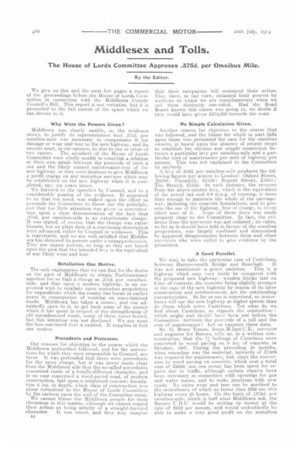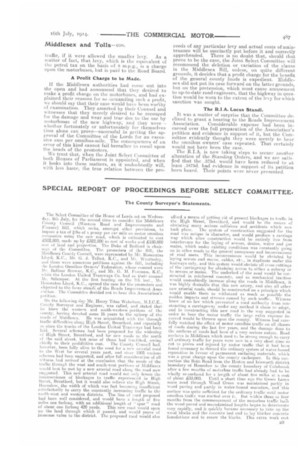Middlesex and Tolls.
Page 2

Page 3

If you've noticed an error in this article please click here to report it so we can fix it.
The House oI Lords Committee Approves .375d. per Omnibus Mile.
By the Editor, We give on this and the next few pages a report of the proceedings before the House of Lords Committee in connection with the Middlesex County Council's Bill. This report is not verbatim, but it is presented to the full extent of the space which we can devote to it, Why Were the Powers Given?
Middlesex was clearly unable, as the evidence shows, to justify its representation that .376d. per oninibus-mde was necessary to compensate it for damage or wear and tear to the new highway, and its success must, in our opinion, be due to one or ether of two causes. The members of the House of Lords c)orrunittee were wholly unable to establish a relation tu their own minds between the proceeds. of such a Lax and the likely annual maintenance-cost of the new highway, or they were desirous to give Middlesex a profit charge on any motorbus services which may be established on the new highway when it is completed, say, six years hence. We listened to the speeches by Counsel, and to a considerable poation of the evidence. It appeared to us that too much was staked upon the effect to persuade the Committee to throw out the principle, mid that too little attention was given to concentration upon a clear demonstration of the fact that .37ad. per omnibus-mile is an extortionate charge. It was stated, of course, that the charge was extortionate, but no plain data of a convincing description were advanced, either by Counsel or witnesses. This is regrettable, and we are well satisfied that Middle. sex has obtained its powers under a misapprehension. They are unjust powers, so long as they are based: upon the plea that the intended levy is the equivalent of any likely wear and tear.
Retaliation One Motive.
The only explanation that we can find for the desire on the part of Middlesex to obtain Parliamentary sanction for 50 high a charge as .375d. per omnibusmile, and that upon a modern highway, is an 1.1navowed wish to retaliate upon motorbus proprietors for expenditure which the county-has borne in earlier years in consequence of running on macadamised roads. Middlesex has taken a course, and one admittedly open to it, to gef back some of the money which it has spent in respect of the strengthening of old macadamized roads, many of theni water bound, but this intention was not disclosed. We are none the less convinced that it existed. It supplies in fact one motive.
Precedents and Pretences.
Our reasons for objecting to the coarse which the Middlesex authorities followed, and for the instructions for which they were responsible to Counsel, are the-se. It was pretended that there were precedents for the same charge, but it was never made clear from the Middlesex side that the so-called precedents concerned roads of a totally-different character, and in no case concerned awood-paved road, of modern construction, laid upon a reinforced -concrete foundation 6 ins. in depth, which class of construction was alone submitted to the House of Lords Committee by the cartoon upon the wall of the Committee-room. We cannot blame the Middlesex people for their cleverness in this matter, although we cannot regard their action as being strictly of a straight-forward character. It was smart, and they may imagine at that their ratepayers will commend their action. They have, in our view, obtained their powers by methods to which we are complimentary when we call them distinctly one-sided. Had the Road Board known this clause was going in, we doubt if they would have given Z375,000 towards the road.
No Simple Calculation Given.
Another reason for objection to the course that was followed, and the blame for which in part falls upon those who presented the case for the omnibus owners, is based upon the absence of proper steps to establish the obvious and simple connection betwe,-en a particular levy per omnibus-mile and a particular cost of maintenance per mile of highway per annum. This was not explained to the Committee by anybody.
A levy of .219d. per omnibus-mile produces the following figures per annum in London: Oxford Street, 22100; Piccadilly, 2:1430; Regent Street, 21030; The Strand, 116ao. In each instance, the revenue from the above-quoted levy, which is the equivalent of the petrol tax and 6:9 m.p.g. of running, is more than enough to maintain the whole of the carriageway, including the concrete foundations, and to present the use of the highway, free of charge, to every other user of it. None of these facts was made properly clear to the Committee. In fact, the evidence from the surveyors was not collated ; its value, so far as it should have told in favour of the omnibus proprietors, was largely confused and discounted by apparent disagreements between them and other surveyors who were called to give evidence by the promoters.
A Good Parallel.
We wish to take the particular case of Castelnau, between Hammersmith Bridge and Ranelagh. It was not mentioned--a grave omission. This is a highway which may very fairly be compared with the proposed newhighway : wooden blocks laid on 6 ins, of concrete, the concrete being slightly stronger in the ease of the new highway by reason of its later eonstruction and reinforcement, are the outstanding characteristics. So far as use is concerned, no motorbuses will use the new highway at higher speeds than do those which serve Castelnau. Yet what do we find about Castelnau, as regards the connection-which might and should have been put before the Committeebetween the proceeds of a toll and the cost of maintenance I Let us examine these data.
Mr. G. Bruce Tomes, Assoc.M.Inst.C.E., surveyor and engineer for Barnes, tells us, in a written communication, that the 7?, furlongs of Castelnau were converted to wood paving on 6 ins, of concrete In October, 1907. During the preceding 18 months, when macadam was the material, upwards of 21500 was required for maintenance, but, since the conversion to woad paving on concrete, which cost a total sum of £9500, not one penny has been spent for repairs due to traffic, although certain repairs have been necessary in connection with openings for gas and water mains, and to make inactions with new roads. No extra wear and tear can be ascribed to the motorbuses, of which no fewer than 2236 use this highway every 24 hours. On the basis of .1875d. per omnibus-mile, which is half what Middlesex ask, the Barnes U.D.C. would be storing up money at the rate of 2630 per annum, and would undoubtedly ha able to make a very good profit on the motorbus
traffic, if it were allowed the smaller levy. As a
matter of fact, that levy, which is the equivalent of the petrol tax on the basis of 8 m.p.g., is a charge Upon the motorbuses, but is paid to the Road Board.
A Profit Charge to be Made.
If the Middlesex authorities had come out into the open and had announced that they desired to make a profit charge on the motorbuses, and had explained their reasons for so icinianding such a profit, we should say that their case would have beexi wor-thy of examination. They asserted by their Counsel and witnesses that they merely desired to be recouped for the damage and wear and tear due to the use by motorbuses of the new highway, and they were whether fortunately or unfortunately for themselves time alone can prove—successful in getting the approval of the Committee of the Lords for an excessive sum per omnibus-mile. The emsequences of an error of this kind cannot fail hereafter to recoil upon the heads of the promoters.
We trust that, when the Joint Select Committee of both Houses of Parliament is appointed, and when it looks into these matters, as it undoubtedly will, with less haste, the true relation between the pro ceeds of any particular levy and actual costs of maintenance will be succinctly put before it and correctly apprehended. There is no doubt that, should that prove to be the ease, the Joint Select Committee will recommend the deletion or variation of the clause in the Middlesex Bill, unless, on quite different grounds, it decides that a profit charge for the benefit of the general county funds is expedient. Middlesex did not put its case forward on the latter grounds, but on the pretension, which must cause amusement to tip-to-date road engineers, that the highway in question would be worn to the extent of the levy for which sanction was sought.
The R.I.A. Locus Standi.
It was a matter of surprise that the Committee declined to grant a hearing to the Roads Improvement Association. Considerable expense had been incurred over the full preparation of the Association's petition and evidence in support of it, but the Committee evidently thought they were merely to hear the omnibus owners' ease repeated. That certainly would not haVe been the case.
The R.I.A. is now taking steps to secure another alteration of the Standing Orders, and we are satisfied that the .375d. would have been reduced to at least .1875d. had evidence in support of its petition been heard. Their points were never presented.
























